Personality and Temperament
Bold features, a thick, luxurious coat, and an incredibly friendly personality set the Maine Coon cat apart from the rest. These gorgeous cats love to play, but they enjoy taking time out for a well-earned nap when the mood strikes. Often, Maine Coon cats snuggle up next to their favorite people, which can be quite helpful on chilly evenings!
The Main Coon’s purr is warmly expressive, and it’s often loud enough to be heard from several feet away. Their vocalizations are surprisingly quiet for such big cats, but their vocabularies can be extensive, with a range of chirps and meows.
One of the largest cat breeds in existence today, and one of the most popular breeds worldwide, the Maine Coon has a heart to match its stature. These cats love people and get along well with other pets. They are ideal for families as they tend to have an appreciation for children. When you meet a Maine Coon cat, you'll understand why they are called the gentle giants of the cat world.
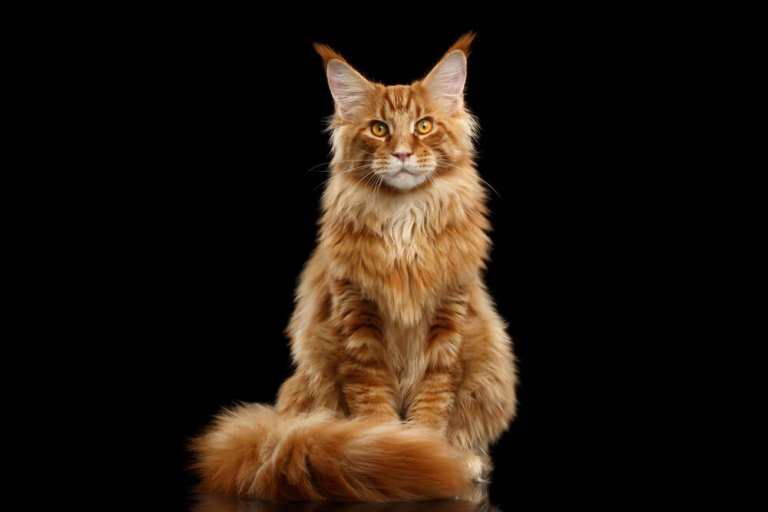
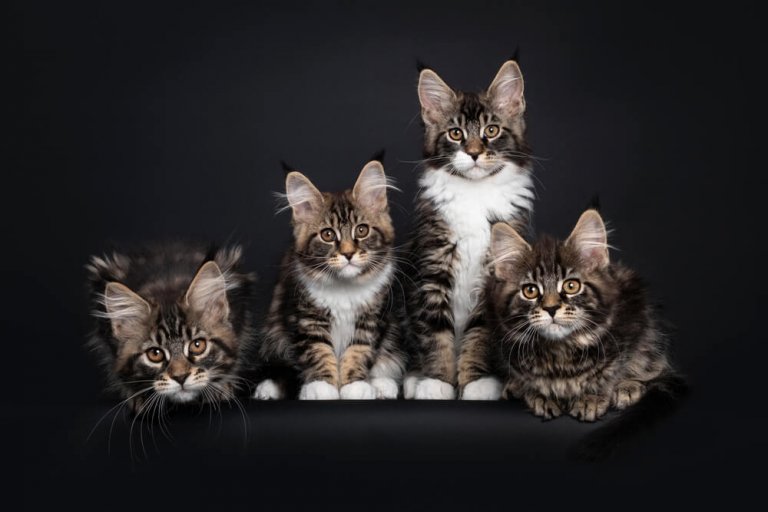
Care
Nutrition
Grooming
Exercise
Health
Maine Coon cats have no special nutritional needs. However, it is worth noting that these large cats need a high-protein diet, and their daily caloric needs can be far higher than that of a smaller cat. We recommend feeding your Maine Coon cat a fresh diet or offering a high-quality commercial brand that lists real fish or meat as the number one ingredient.
As your Main Coon ages, you might find it necessary to cut back a bit so your cat doesn't pack on extra pounds. Offering an age-appropriate diet is one of the best ways to help your cat enjoy good health throughout their golden years.
The Maine Coon has a thick, dense double coat with a silky soft undercoat. The coat needs thorough brushing at least two to three times a week to prevent matting. Some Maine Coons might need daily brushing. Your cat will appreciate the regular grooming sessions and view them as an additional opportunity to bond.
Teach your Maine Coon to accept nail trimming from a very young age. Keeping your Maine Coon cat's claws trimmed will spare your furniture, your clothing, and your skin.
Also consider teaching your Maine Coon to allow you to brush their teeth. Daily brushing at home is the best way to keep your cat's teeth healthy and help maintain your pet's overall wellness. Daily tooth brushing can also help cut back on the frequency of professional dental cleanings.
Maine Coon cats are playful, but they are equally fond of lounging. Too much inactivity can lead to obesity over time. Encourage your Maine Coon cat to play using feather wands and fishing pole toys, tossed balls and fuzzy mice, and laser pointers (never shine the light in their eyes and prevent frustration by giving them a real toy to "catch" at the end of the game). If possible, consider teaching your Maine Coon to walk on a leash and secure harness. The more activity your cat gets, the better their health is likely to be for the long-term.
Maine Coon cats are generally very healthy. Most pedigreed cats have certain genetically linked health conditions known in the breed. For the Maine Coon, the most common include feline hypertrophic cardiomyopathy, hip dysplasia, and spinal muscular atrophy. Reputable breeders take care to screen adult cats prior to breeding them, which minimizes the likelihood that they will pass these problems on to their kittens.
History
As you might have guessed, the Maine Coon cat is a native of the state of Maine. Endemic to the United States of America, this breed probably originated in the 1850s, when long-haired cats were brought to America and mated with local short-haired cats. The result was a hearty, healthy, large cat with incredible hunting prowess; a heavy, shaggy coat; and a long, flowing tail.
The breed was exhibited at cat shows throughout the late 19th century. Farmers who prized these cats for their outstanding ability to keep barns and outbuildings free from rodents held their own competition, called the Maine State Champion Coon Cat contest at the Skowhegan Fair.
Maine Coon cats fell out of fashion during the early 20th century, when more exotic long-haired cat breeds such as Persians came to the United States. The breed declined until the 1950s, with some people believing the Maine Coon might have even become extinct.
Maine Coon cat aficionados Alta Smith and Ruby Dyer founded the Central Maine Cat Club (CMCC) in 1953 to preserve the breed for future generations. In an effort to increase awareness about the breed, the CMCC posted cat shows and exhibitions that featured photographs of Maine Coon cats. The CMCC created the first written breed standards for Maine Coon cats, helping this unique breed regain popularity.
Ethelyn Whittemore of Augusta, Maine, whose family had continued casually breeding Maine Coons during the breed's time of unpopularity in the U.S., founded a Maine Coon cattery and kept written breeding records of her cats. Her cats were often winners at CMCC shows.
The Maine Coon Cat Club formed in 1973, with a goal of helping the breed achieve recognition by the Cat Fanciers' Association. In May 1975, the CFA granted Maine Coon cats provisional status; the Maine Coon was approved for championship status in 1976. Today, Maine Coon cats are recognized by all major cat registries.
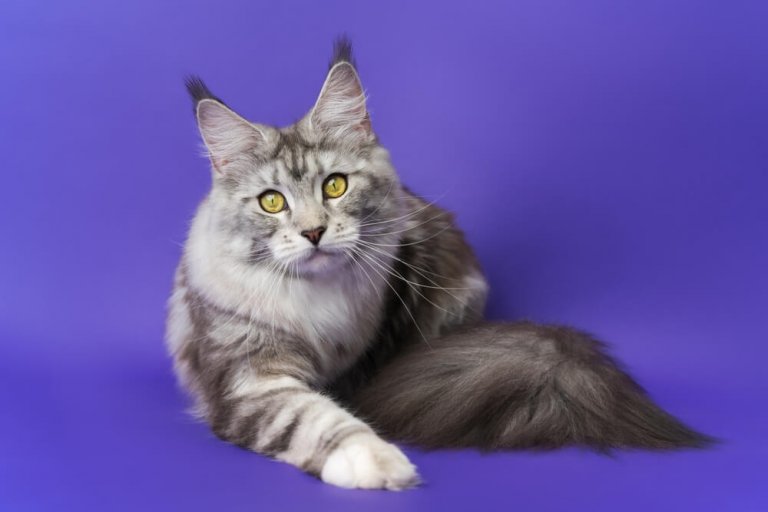
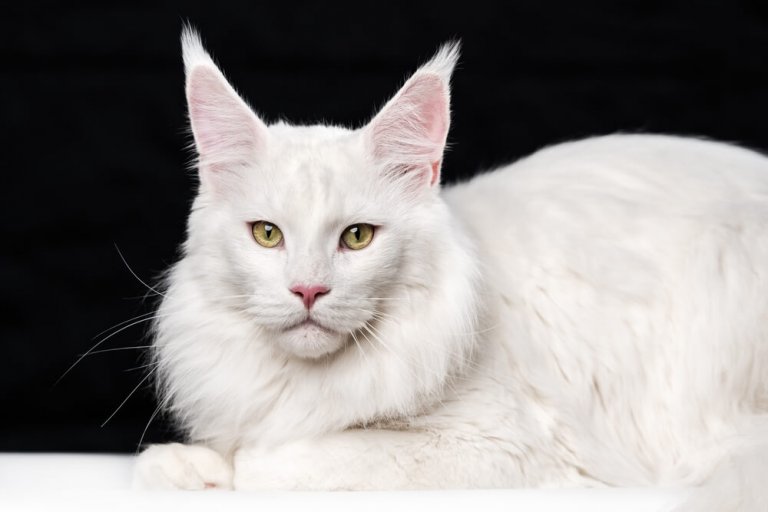
Eyes
Legs & Paws
Tail
The Breed Standard
Body
Head
Ears
Coat
Color
FAQ
How much does a Maine Coon cat cost?
Maine Coon cats cost between $400 to $2,000.
How big do Maine Coon cats get?
Maine Coon cats tend to be large in size. A fully grown Maine Coon cat might weigh between 9 to 20 pounds or more and range in height anywhere from about 10" to 16" inches tall.
How long do Maine Coon cats live?
The Average lifespan for Maine Coon is 9 to 15 years.
Do Maine Coon cats shed?
Maine Coon are long-haired cats, so you do have to expect a certain amount of shedding from this breed, but they don't shed as much as other cat breeds.
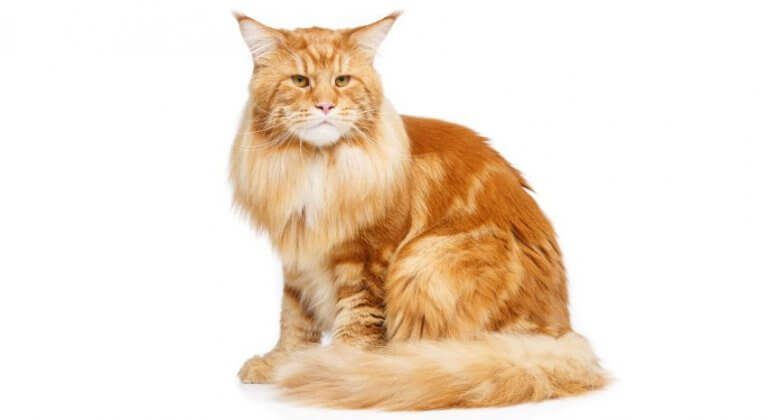
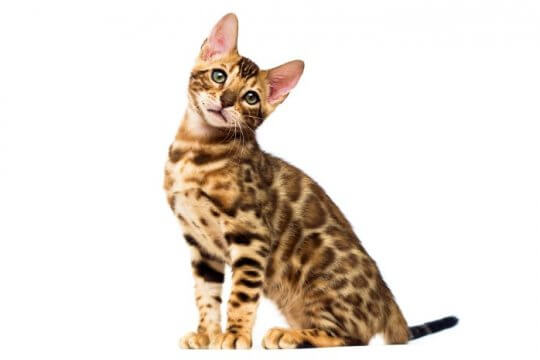
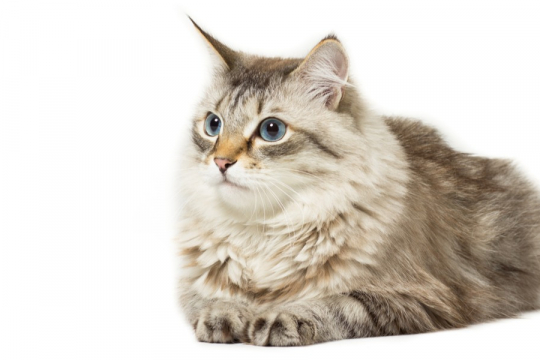
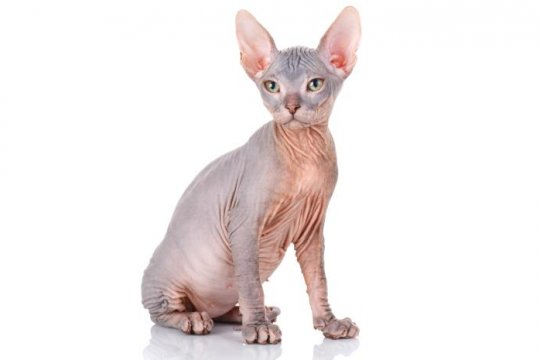
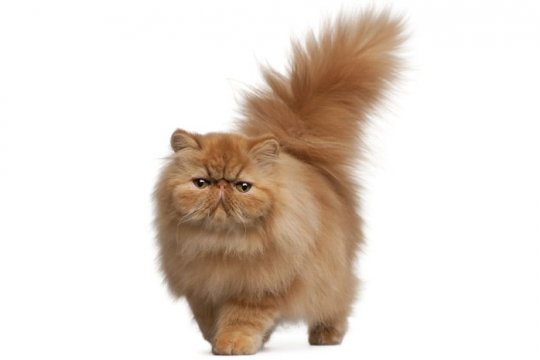
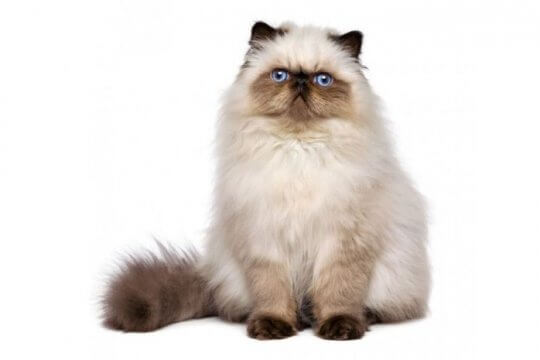
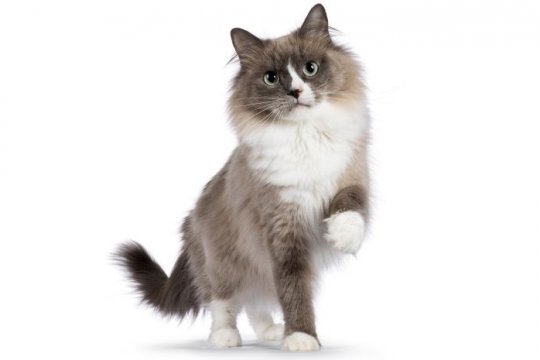
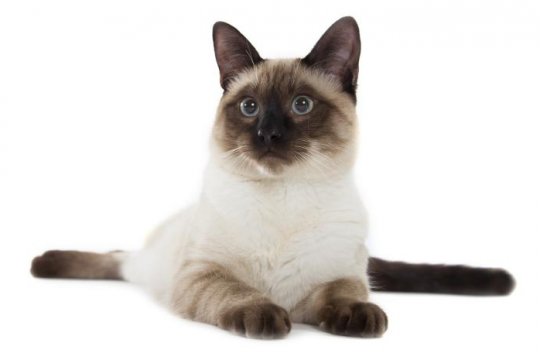
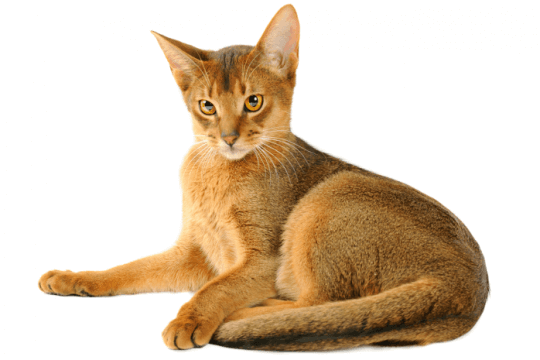
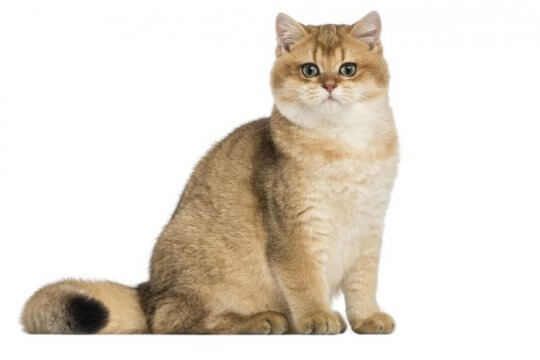
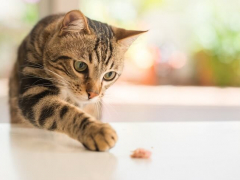
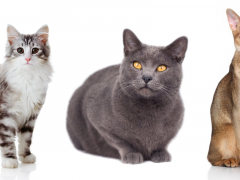
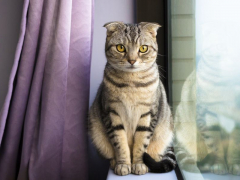
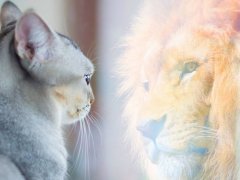
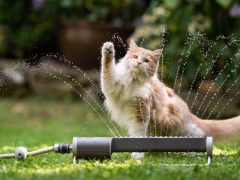
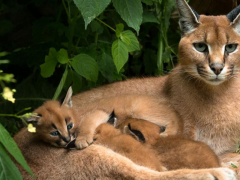
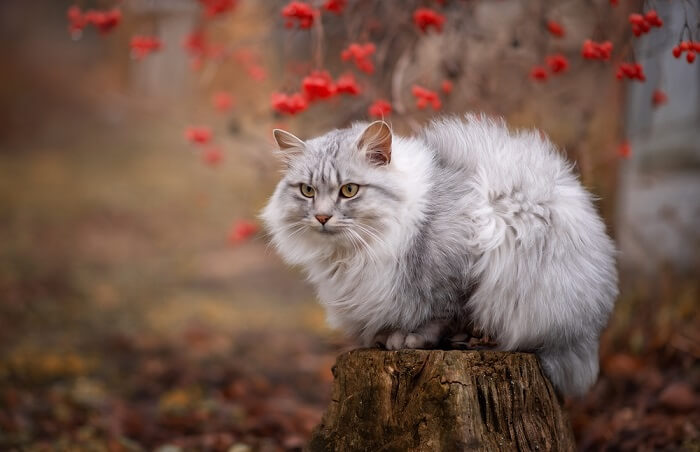
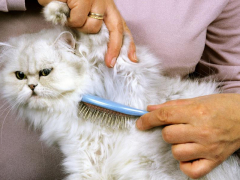
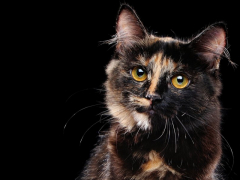
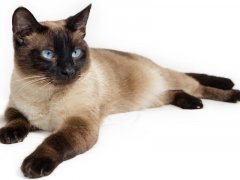
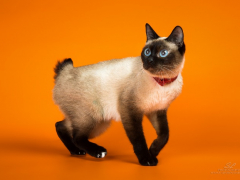
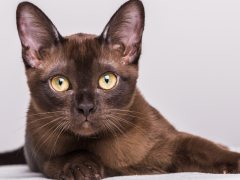
i have decided that I NEED a Maine Coon Cat. I have always been a dog person. Most recently I had two maltese dogs. One was very comforting and stayed with me all the time while the second is more aloof, and doesn’t like to cuddle. My first maltese died of complications from diabetes and I am long for a cuddle buddy. I have been spending time with a friend who has a Newfoundland, a St. Bernard, a Pomerianian , a Maine Coon cat, a domestic short hair cat and a Persian. Her mother had a tonkinese, which I also loved, but until last week it has been a hands down win with the Maine coon as the most desireable pet. Hope to find one soon.
Maine Coons are often described as gentle giants. But what if you get one who isn’t?
About ten years ago we bought a Maine Coon kitten. She had been raised in dreadfully overcrowded premises with two queens’ litters all thrown in together. She was the smallest of all the kittens. Many were quite large males. So from the moment she opened her eyes, she had to fight and go on fighting. She got beaten up constantly. She got the message very thoroughly that life consisted of fighting. When she came to us she had no whiskers. They had all been chewed off in kitten-fights. The breeder assured us this was quite normal but I don’t think so. A cat relies on its whiskers for all sorts of sensory information. It must have been like being partly blind.
As she grew up she became a real hooligan. She would attack any of our other cats. As far as she was concerned any other cat was automatically the enemy. It was impossible to stroke her because she would interpret any movement of a hand coming towards her as a possible attack and either lash out or bite. She had no idea how to look after herself because in the dreadful chaos she had been raised in, her mother-cat had not been able to teach her much. Keeping her coat brushed and free of lumps was very difficult. Fortunately our big Siberian is a very maternal cat and when our half-grown Maine kitten attacked her, she put out a large golden paw, held her down and washed her very thoroughly all over, after which they curled up together. So our Maine did get some proper cat-mothering. Possibly it was the saving of her.
As she grew she became extremely large and strong and remained nervous, jumpy and bad-tempered. There were years when we wondered if we could cope with her. It wasn’t her fault, poor cat. It was the fault of her first dreadful twelve weeks of life. Underneath all the aggression we could see glimpses of a very nice, intelligent, affectionate cat. But you just try living with a very strong fifteen pound hellcat who is all muscle and liable to lash out at the slightest provocation. Try to pick her up, stroke her or brush her and she would commence to wowrrl and “swear”. The claws and the teeth would come out very quickly. For some years it was fairly dangerous to be near her.
We persevered, because after all, who else would take her on? We left her to her own devices when she wanted peace. Fortunately our place is large, rambling and dilapidated with plenty of hidey-holes for a cat who just wants to get away from it all and have lots of peace and quiet. We fed her treats. We told her she is beautiful and that we love her. We spoke to her very gently. (She is acutely sensitive to a sharp or a raised voice). We let her get on with it in her own time and at her own pace.
Today she is a ridiculously affectionate cat with a magnificent fluffy coat who purrs constantly and loves to lie on me full-length and receive fuss, strokes and compliments. She has indeed become a real gentle giant, very much beloved and spectacularly beautiful.
But it has taken the best part of ten years to get there. If a cat’s trust is badly damaged, it can take a long time to heal. The bigger breeds, Maines and Siberians certainly, maybe Norwegians too, are not quite like ordinary cats. They are more intelligent. They give more to their humans. But they demand more understanding in return.
So if you want a Maine Coon kitten, it is very important to inspect the breeder’s premises carefully. Find out as much as you can about the conditions their kittens are raised in. Don’t listen to sales talk. Check. Remember that to some breeders, their kittens are not pets. They are revenue-earning livestock.
None of that is a criticism of the breed. I think Maine Coons are wonderful cats. She is certainly a marvelous companion these days. Her earlier, difficult, years, were definitely not her fault. But do remember that a big, physically powerful, highly intelligent cat can be quite difficult to live with if circumstances or her history have made her unhappy. Taking one on is a serious responsibility.
Thanks – this is a great and a very insightful text. I agree although there’s a lot of “nature” in this breed (they are inclined to be kind and loving through decades of careful selection), but when a “nurture” factor kicks in, it can turn the most loving and affectionate kitten into a proverbial cat from the hell. So, yes. always research your breeder, visit them if possible, and take time to meet kittens and select your new friend in person, not just by pictures.
One minor note – kittens do indeed chew off each others’ whiskers – not uncommon at all. This doesn’t necessarily involve fights, sometimes other kittens or even mother cats do it while grooming.
We had a Maine Coon live for 18 years. At one time he topped 27 lbs, and despite being declawed, bullied all other cats in the neighborhood by using his massive weight to pin down any feline that dared challenged him. He acted like a dog and would come, sit, and laid down at commands…very unusual. He even knew how to turn doorknobs to open doors, and liked to take baths. He loved being petted, unless he was in a bad mood…then look out! vicious. We miss him dearly.
Glad to hear you had such a wonderful Coonie. But please, if you get another one (or any other cat come to that), don’t be so cruel as to have it declawed.
Why on earth do people declaw cats? It’s like stopping a dog from barking. I feel it’s just cruel. I would NEVER trust a person who declawed their cat.
F BENJAMIN
Perhaps someone else has already pointed this out, but a reputable breeder or rescue is invaluable to help you find the right pet for you and will take back a pet at least with a two week window of time.
As with anything in life ” buyer beware”.
Excellent insight of what can happen when a kitten is left to fend alone in a stressful situation. I have three Maine Coons from three different breeders. Leo comes from a breeder who spent lots of time with the kittens and the males were kept at another location than the queens and kittens. He was friendly and loving from day one. Forrest came from a breeder that had the kittens in the house and they were part of the family. Same as Leo, he was a cuddler from Day 1. Stella came from a breeder that had a cattery separate from the house and the kittens were not exposed to much human contact and playing. Human interaction came at feeding time and when litter boxes were changed. It took about 2 years to come around to really seeking out and enjoying human interaction. She now sleeps with me and is close to wherever I am. I call her the beautiful Stella and she purrs and snuggles. The breeder environment those first 12 weeks makes a huge difference to the personality of the kitten you bring into your home. Do some research before buying a kitten. Maine Coons are the most amazing animals I’ve ever had. I say I have dogs, cats and Maine Coons. They are a totally different experience.
Totally agree the way you speak to a cat is vital in communicating with any cat and helps promote a relationship to develop into a bond. All cats are extraordinary therapy/emotional support animals. I think you probably are aware, it’s “Mutual Rescue” providing a home for a cat. LOVE. PEACE. God Bless.
This gives me hope and perhaps a map.
We have a 2-year old dog who was raised similarly. We’ve persevered with her nasty side, wondering what to do.
Maybe continued love and kindness along with time will mellow her out. Thanks for the inspiration.
It works, yes. But it can take a long time. Good luck!
As well as being kind to our poor abused kitten, we also had to be firm, especially as she grew into a big powerful cat. She learned she would be reprimanded if she bit us. It was never the sort of full-on predator’s chomp that can take a finger off, but she would give us a painful nip and those big front fangs are needle sharp. The claws? Also extremely sharp and with great muscles behind them. She drew blood on many occasions. Eventually she learned this was not acceptable. Sometimes she would bite one of us then look absolutely embarrassed; “Oh dear, I’ve forgotten my manners!”. Some times she would move as if to bite and we could see her restrain herself. When the battle between instinct and training got too confusing for her she would go off and hide for hours, while she thought about it all. We let her. If we ever had to do anything she disliked, like cutting lumps out of her coat, we would console her with treat foods immediately afterwards. Although she was jumpy and violent, she was never a cat who held grudges, as some do.
These days she is pretty much okay. She will never be 100%. She is still jumpy and always will be. But she is safe to be around, as long as nobody takes liberties with her. She loves to lie on me full-length and purr thunderously. The Maine Coon purr is something to be experienced. We are extremely fond of her, as you might have guessed.
A dog is a different bundle of problems. They are pack animals so you have to be your dog’s pack leader. You really do not want a dog thinking it is your pack leader. How to convince an abused dog you are its pack leader when it is liable to interpret even very gentle discipline as an attack is very difficult indeed. I would suggest getting advice from a canine behaviour specialist.
This depresses me. Think I’ll look back to the smaller rescue and found cats we have enjoyed so much over the years.
I’ve had many cats through out my lifetime but most have been rescued. When my daughter needed someone to take her big cat, I said yes. I wasn’t sure the type but learned he was a younger Maine Coon. I’ve had Dexter for 8 years now and he is huge weighing in at about 24 pounds. He is funny, intelligent, gentle, extremely loving, meows like a little girl and flops over so I can rub his stomach. In many ways he acts like a dog. For such a long haired cat he sheds very little. In the spring I have him clipped in a Lion cut so he stays cool in the summer. By the time winter arrives he is fully fluffy again. I will always seek out a Maine Coon but hope that day is far off. I love Dexter!
I have a very similar cat and story to yours. I’ve always been a cat person. After a long term big orange tabby passed of old age, I went to see 2 rescues from a friend who ran an organization rescuing abandoned cats. One of them immediately bonded with me, and it was decided I should take him home if I was able…..so I did. His name is Rufus and is pushing 10 now. I cannot imagine more of a BFF than Rufus. He’s my best pal and I love having him around. He seemed large for being under a year old when he came home. I didn’t really think about it. Then, like you found out he was a Maine Coon. He grew…..and grew……and grew…..slowly for almost 5 years. He has similar temperament as you mentioned. Exceptionally intelligent and perceptive. Quirk sense of humour. Has odd squeaky vocalizations (when he bothers to but tends to be quiet by nature), and for those he trusts will always roll over for a belly rub. I’ve never done a Lion cut for summer, but I have always thinned his coat wayyyyy down with undercoat grooming tools. He enjoys it also. He loves to play ball. I throw the ball fairly high over top of him and he’ll jump up really high to give it a proper volley ball spike across the room. Or catch it with both paws and hold on as long as he can until he has to let go to land. Neither of us has ever grown bored of this game all these years. I don’t think he is full Maine Coon, and I doubt he came from any sort of Cattery, which I’m glad for. Though I have no way of knowing.
As it happens I suppose, the Maine Coon Cat seems now to be progressively bred to have more exaggerated features. I loved the older form of cat with a rounder head, A big muzzle that was not so long as it seems now, and ears that were not so large and with rounder tips. The Maine Coon cat, I’m afraid, might be going the way of the Oriental, the Siamese, and likely some other breeds. Do we still have a choice? Are there catteries that still favor the old appearance? I hope the older style cat still rates well in shows as week or I am afraid we will lose them.
Not sure if you’ve seen this interesting history of Maine Coon breed standards—I haven’t seen any indication that the breed standard is becoming more and more exaggerated, but perhaps I’m missing something. If you have any examples of this trend, it would be fascinating to be able to share it somewhere. Thank you!
I concur with Ms Bishop the more recent photos of Maine Coons show very exaggerated features – a big square, pushed-out muzzle and HUGE ears! They hardly look like cats. It’s very unattractive. The “old style” cat looked much more like a cat – rounder head, not a prominent square muzzle, ears in proportion.
And by “old style”, my nephew had one born about 2010.
The other breeds she mentions also have been bred to an extreme of exaggerated features that, to me, they’ve lost their original elegant appeal and are bred purely for cat fanciers.
I have a beautiful female retired breeding queen who came to me when she was 6 and a half years old. It has taken her almost three years to break the shackles of her controlled past. Firstly she cried all the way home the day I collected her then hid in her bedroom for days and then hid again every evening when I went in to spend with her until morning. She must’ve missed all her Maine Coon siblings she lived with terribly. Eventually she slept next to me but any movement from me sent her hiding under the bed. I let her go outside after 3 months and couldn’t get her in. Freedom at last! I’d watch her so happy just sitting out there mid winter in the rain or snow. My heart.
It took hours each early evening to coax her in whatever the weather, she would prefer any time outside than with me inside. But now after my patience and understanding she will spend time inside with me and chats away constantly. She loves to play simple games with ribbons or long fishing rod toys. Her purs are quiet but still she purs when I stroke or groom her. She looks at me with trust and love. Finally.
She has some weird traits, like loving anything plastic. She licks bubblewrap and bags or try’s to scoop them up to make a nest to sleep on. Every day this happens.
She is my lovely independent girl. We understand each other and I’m so happy to have her in my life entertaining me.
I love her very much
We got one a year ago at the shelter, well two sisters. One is a torby short hair and the other is a torby/maincoon, both beautiful and growing into two great kitties. They talk, open up drawers and play with the sink, also they love anything to play with so i am always watching for what they have goten into now and moving things up higher. But the maincoon is funny she follows me everywhere and I agree very smart. I brush once a week to keep her hair nice. I have never had sisters before, they clean each other, it is so cute and chase and play, one thing is we got a play structure and scratching post 1st thing. I look forward to them growing and having them in our lives and always check shelter’s they can have some great babies.
got our first baby today we love him so much
we have a coon cat and mix with something else he 2 in the last to week he up all night cryiny in the week what should i do with that
Cats might start crying a lot at night for a variety of reasons. You can learn about it here.
I am a dog person; I’ve bred raised and shown Spaniels for most of my adult life, over 50 years now. That said, I’ve also always had a cat, mostly Abyssinians, and I always enjoyed them. The dogs and their cat always got along famously! But I recently moved into a smaller home and decided that I would try a less active cat. I have friends who had Maine Coon cats and always raved about them. So I got on the waiting list of a breeder of Maine Coons who was adamant about health testing and temperament. I wanted a male, but had no other requirements. My sister and I drove about 300 miles to pick up my 14 week old kitten, who turned out to be a silver tabby! And such a handsome boy!! His name is Clark, after Sunshine Superman, and he is everything I can imagine wanting in a cat. He is now four years old. He has no desire to go out doors, which I’m thrilled with. He has bonded with any dog that lives here or comes to visit. But his favorite by far is my Champion, three year old, blue roan English Cocker, Robbie. They wrestle and chase, with Clark often “nailing” Robbie to the floor. There is never any growling or angry noises from either one of them. The blue roan and silver tabby colors are so similar that it’s often difficult to tell which is who. they are making my senior years a joy!!
Thank you for this informative website which confirms my suspicions that our neighbor’s previous cat and the present one are Main Coon cats. These striking black and white felines were probably siblings from the same breeder, being almost identical. In fact, another neighbor thought they had been always seeing the same cat for the last couple decades. The first one did live many years, considering that the owner, who is not a talkative or sociable person, would leave it outside year-round, occasionally for weeks at a time while she travelled elsewhere. I have read on another site that Main Coon cats were originally bred as outdoor winter cats, and I had marveled at its endurance. Anyway, we found out that yet another neighbor had sometimes fed it, and that “it” was actually a “she” who gave birth to a litter in the dead of winter outside. We are talking about a suburban Montreal, Canada environment here.
By this time I had gone from being a cat person to an exotic bird person after our last cat Tessy, a rescued stray, had died at age 20. I taught Tessy to leash-walk, or rather the skill was passed down through successive cats by each other, after I first taught my Siamese, a dog-like breed who will fetch a ball, to do so. (This skill came in especially handy when Tessy went blind in her later years, in fact she became a better leash-walker than before.) Apparently playful Main Coons are similar to Siamese in this respect. But our neighbor did not train hers, she just opened the door. The Coon cat was friendly at first and even made attempts to enter our home, her bold macho attitude having me assume she was male, albeit with a tiny tinkerbell voice. But being a bird person, I did not encourage her. She picked up on my vibe and would stay a few feet away, but was very affectionate with other neighbors.
Nor did I welcome her with open arms into our back yard as we have birdbaths. However the second Coon cat, like the first, seems to assume ours is the home away from home and prances over with a proud, entitled gait, to the extent that some neighbors have assumed they are ours. We often turn a blind eye when they visit our sheltered balcony, especially when the snow is deep and the temperature frigid. In this area, many are up in arms about cats roaming freely, there are many environmentalists and birdwatchers, and there is often talk of coming legislation.
I rated the Main Coon cat breed as four stars, but that is with the provision that they should not roam freely in urban areas. My heart was broken when the first one killed the two baby squirrels that we loved observing. But that is in a cat’s nature, and apparently Main Coon nature especially, as they were reportedly first owned by farmers as a “working breed” to keep vermin out of barns. And no doubt both these black and white visitors have helped keep the house mice population in check, though the odd one still gets inside, which we and our indoor birds do greatly appreciate.
Hello
I am searching for a main coon mature cat that is affordable. I recently lost my 11 yr old cat and it is very lonely. Please let me know if you know of one.
Hey Sherril, this is a question for someone in your local area. I would recommend searching “Maine Coon breeder” + “(your town name)” and seeing what comes up. Local cat Facebook groups or friends may also be able to help.
I have a beautiful female coon,she’s everything you have said here and more ,extra toes and all..
I recently lost my kitty best friend, Angel, a 9 year old Maine Coon Rescue Kitty. She was the kindest, most compassionate, emotionally intelligent being I’ve ever met.
Losing Angel breaks my heart.
Love our Maine Coon cat. Is a great mouser for mice, moles, birds and small rabbits. Very friendly and loving. Can open doors, especially my closet, where it likes to sleep and hide at times. One of the best cats I’ve owned. Like to sleep with us. Especially on top of my wife at times.
Is it possible to bring a Maine Coon Cat into a home with 3 dogs…..all of whom have sweet temperaments? I have a 9 y/o Boxer bitch, a 7y/o GSD bitch, and a VERY gentle
3 y/o male Great Dane.
Hi Rhea, I apologize for the late reply! A cat of any breed can join a home with multiple cat-friendly dogs. You’ll just want to take care to introduce all of them properly!
Thanks for article and most everyone’s comments. My wife and I recently bought a home in the country, and we had a visitor this past weekend. My wife loves cats, but I don’t care for them at all as I’m allergic to them… always sniffling within minutes of touching one. This visitor we had was the cutest Maine coon I’ve seen. He loved being center of attention with my wife feeding and watering outside our garage, but he continued walking past her to come play with me. I had on gloves initially because I was moving stuff, but then grew to love this cat who acted like a dog, and I shed the gloves. We bonded for several hours afterwards, and I noticed I wasn’t having any allergic reactions at all! The past few days have been spent searching for neighbors asking if they own him… we are in luck:)
We will be taking him to vet for checkup and microchip soon… proud lover of dog has just become Maine coon whisperer 😂
Ooh, exciting times! Here’s to you and your new friend.
We have had 3 Maine coons, the wife and I, over the years, and every one of them was a rescue cat. there is a coon cat rescue out there. we were ready to drive two states over, but found one just down the street from our house. so we went there first. i was holding her, she was purring and looking around the pound, so I hissed at her. she hissed back. had to have that cat. great mousers. i would recommend a large cat tree for them, as they are very athletic and like to be up high. they will dash up their tree whenever they think you will go past it. i wrapped the timber trunks of these trees with sturdy natural fiber rope, as their claws are not designed like normal cats and they will shred the carpet that comes on regular trees. they need to be brushed during the shedding season, or they will get hairballs. high ash cat foods have not done well in our home on them for some reason, so go lightly if you think that they have a UTI issue. they need a healthy diet, as they are very active. they will go for walks with you, and i have even seen people jog with their coons, on leashes, of course. they love to play in the snow. they are very shaggy little beings, and probably hate hot and muggy, but i had a neighbor in Guam (Hot and muggy central) who had two of them. they hated going outside, but they were good with air conditioning. they like to play, they need toys, they need a place to hide and rest, a box in a corner with a blanket in it will work, every one of ours likes this little round “stump” that is covered in carpet. it has a hole in the side where they can crawl inside it. i use it as an ottoman, even with the cat inside. they need lots of clean water, and one of these bubble filters seems to be a fave with them. they will even learn to like ice cubes in the water. some pets, like bunnies will not often drink moving water, so if you have a communal “watering hole” then the bubble filter setup probably is not a great idea. our bunny is underfoot, and gets along with the resident coon cat. if you go the rescue route, please remember, that they were given up because they were a big cat, and may not have been loved, but i have yet to see a coon cat that will not love you back as much as you love them, it might just take some time. they will sleep on the bed with you, wake you up at feeding (this may be at 2 AM, but they are like German shepherds, and will demand food when they are hungry. they will follow you around the house, and even herd you toward the food dish area from time to time. they are very vocal, and they like to pretend to play rough, so be careful with that, they have half inch claws. i leave them intact, as they can scamper up the cat trees a lot better with four wheel drive. I am not really a cat person, but Coon cats are not really just cats. our first one even got along with my Akita. she would even stalk that dog when she was angry with it. Coons are not at all for everyone, make friends with one first, they are an awful lot of cat, come with personalities the size of horses, and have the heart of lions.
I’m in need of one of these Maine cool kitties